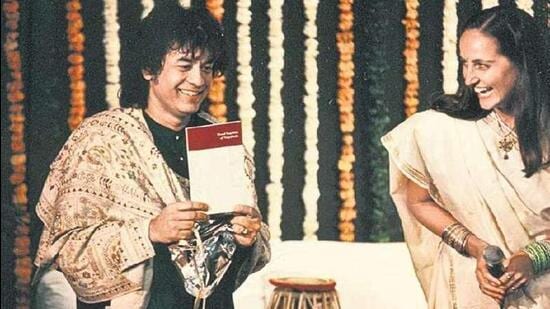Wednesday’s event in Vashi is devoted to the memory of the late Hindustani music icon and surbahar exponent Guru Annapurna Devi
MUMBAI : “It takes much effort to preserve, promote and propagate our Indian performing art forms at a time when there are so many attractions on OTT platforms, cinema and TV,” said tabla maestro and composer Ustad Zakir Hussain. To that end, he thanked “Keli for coming into my life and introducing me to the unique rhythm culture of Kerala. It was a revelation for me and fellow artistes that we have so much to learn”.

Recognised for presenting distinctive and on-the-verge-of-extinction Indian performing arts, the organisation will wrap up its year-long tricennial celebrations on Wednesday, with a tabla-chenda (traditional Kerala drums) fusion between Hussain and Padmashri Peruvanam Kuttan Marar, apart from a solo performance by Hussain.
Wednesday’s event in Vashi is devoted to the memory of the late Hindustani music icon and surbahar exponent Guru Annapurna Devi (her students included flute players Pt Hariprasad Chaurasia and Nityanand Haldiur, and sitarist Nikhil Banerjee).
Not many are aware, but Keli which has organised over 50 festivals in 30 years, working with over 1,500 artistes and reaching over a 1,50,000-strong audience, began as an initiative by seven performing art enthusiasts. K Ramchandran, the artistic director of Keli, was one among them. He reminisced: “In the early ‘90s opportunities to watch Kathakali in Mumbai were far and few. There were sporadic performances in Vasai, Dombivli and Bhandup. We would travel all over eagerly awaiting the next performance. We even went to Pune for the Sawai Gandharva festival to watch Pt Bhimsen Joshi, Kishori Amonkar and Pt Jasraj perform.”
Ramchandran, who was then staying in a hostel at Dadar, met Kathakali maestro Kalamandalam Gopi and his troupe who were touring Mumbai at the time and asked him to perform for the inaugural Keli show. “That was the beginning. We never looked back.”
Keli has since made a name for itself for organising yearly thematic festivals. “The theme this year was on the complex connections between art and history, anthropology, sociology and politics,” said K Ramchandran. “We examined how art forms can be transformative, recognising how concepts, practices, exchanges, influences and audience interaction have evolved over time.”
A couple of days ago, for instance, at Vashi Kerala House, Keli and IPTA Mumbai, organised a seminar on folklore, “covering a wide range of subjects, from the social aspects of aesthetics to the fascinating secret language Mygurudu, (used by convicts in northern Kerala during British rule)”.
Through the platform over the last three decades, audiences have had the opportunity to watch performances by acclaimed artistes such as Malavika Sarukai (Bharatnatyam), Dr Balamuralikrishna (Carnatic vocal), Pandit Ram Narain (Sarangi), Dr Kanak Rele and Sathyabhama (Mohiniyattam), Vasudevan Nambudirippadu (Kathakali) and Gopal Prasad Dubey (Chau), among many others.
Lauding Keli, theatre professional Sanjana Kapoor said, “In this time of globalization and rapid advances in communications, it seemed to us most imperative to demystify the classical arts and present the treasures of our cultural heritage in their most authentic and unadulterated form. Keli is carrying out this responsible mission in Mumbai quite successfully.”
Composer-singer Sunil Koshy said, “Keli not only helps promote the performing arts but also catalyses training of new and younger audiences who become familiarised with and learn to appreciate the finer nuances of the art forms. And look at their sheer oeuvre — Carnatic, Hindustani, instrumental, vocal, dance: genres which fall in the intersectional space between theatre, dance and music.”
Ustad Zakir Hussain is performing at Cidco Exhibition Centre, Vashi, at 6:30 pm, tomorrow.
